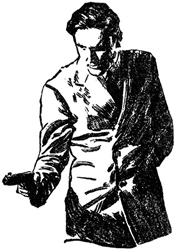

The moon was high in the sky when the old-fashioned telephone on the stand at the top of the stairs rang.
A red light on its base blinked.
The telephone rang again.
Phil—in Vishnu-blue striped pajamas, glasses pushed up on his forehead, a forefinger keeping his place in the book he was reading: a World War I spy novel—hurried out of the first room off the upstairs hall.
“Why the hell don’t they call my cell,” Phil grumbled.
A dead ladybug lay on the stand. Phil crushed the bug between his forefinger and thumb. It made a satisfying crack.
Once more, the phone rang.
Phil looked at it and thought, Now that Harry’s gone, we can get rid of this antique.
The top-of-the-stair telephone jack had been installed half a century ago.
The telephone rang a fourth time.
“Who?” Phil asked into the phone. “What?”
Phil ran a hand through his hair, which stood up like a cockatoo’s crest. He made a few mm-hmm’s, tugged at the tip of his nose, and asked, “Where do you think he’s going?”
Carol hurried out of her bedroom, tying the belt of her quilted bathrobe, holding the current New Yorker at her side.
“What’s happening?” she asked.
“Harry’s escaped,” Phil told her, hanging up the phone.
Carol tried to hide a smile.
“They think he’s on his way here,” Phil said. “We better lock the doors.”
“You really think he’s dangerous?” Carol asked. “Give me a break.”
“He’s not dangerous,” he said, “but he shouldn’t be here.”
“Why not?” Carol asked. “It’s his home.”